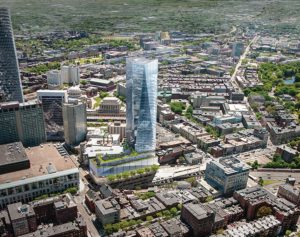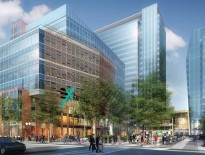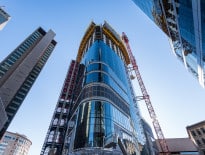
Boston officials this year approved Weiner Ventures’ scaled-back plans for a condo and retail tower in Back Bay.
While Boston is a world-class city with a distinguished history, cultural charm and a robust economy, it is marred by the Massachusetts Turnpike, an unsightly, man-made canyon running from east to west.
Air rights developments over the Turnpike could knit together divided neighborhoods and close this open wound, but the costs of such projects are daunting. To build within air rights, developers must install foundations, supports, decking and ventilation systems without hindering turnpike and rail traffic. Although these feats were accomplished decades ago for the Hynes Auditorium, Prudential Center, John Hancock garage and Copley Place, no air rights projects have been completed in Boston since the 1980s.
A step toward further air rights development occurred in 1997, when the city of Boston and the Massachusetts Turnpike Authority signed a memorandum of understanding giving the city a role in approving such projects. At that time, turnpike air rights were exempt from Boston zoning, leaving no guidance for developers and planners. In 2000, the city published “A Civic Vision for Turnpike Air Rights in Boston,” which offered development guidelines on 23 air rights parcels delineated by the Turnpike Authority. Unfortunately, the Great Recession of 2008 stalled development.
The Massachusetts legislature stepped up in 2009 and 2010, passing laws that authorized the Massachusetts Department of Transportation (MassDOT) to grant 99-year air rights leases, and subjecting air rights projects to local zoning laws. As the economy improved and buildable sites in Boston became more expensive, developers renewed their interest in Turnpike air rights.
The most promising project on the drawing board involves Parcel 15, consisting of about 11,000 square feet above the turnpike, west of the Hynes Convention Center. Weiner Ventures gained the inside track on Parcel 15 in 2008, when it acquired 11,000 square feet of adjacent terra firma from the Archdiocese of Boston for nearly $14 million. MassDOT designated Weiner as the developer of Parcel 15 in 2013.
 Three years later, Weiner unveiled plans to combine Parcel 15 with adjacent air rights owned by Prudential and the city, for a mixed-use project with 35,000 retail square feet, 182 apartments in a 24-story tower, 160 condominiums in a 40-story tower and a 303-space parking garage. The project is known as 1000 Boylston St.
Three years later, Weiner unveiled plans to combine Parcel 15 with adjacent air rights owned by Prudential and the city, for a mixed-use project with 35,000 retail square feet, 182 apartments in a 24-story tower, 160 condominiums in a 40-story tower and a 303-space parking garage. The project is known as 1000 Boylston St.
Scaled-Back Design Wins Approval
Weiner submitted a project notification form to the Boston Planning and Development Agency (BPDA) in early 2017, as required under the Boston zoning code for large-scale developments. Months of community meetings and public commentary followed, during which abutters complained about project mass and shadow impacts.
In response, Weiner scaled back the proposal, eliminating the rental apartment tower and reducing the condominium tower’s height and the number of parking spaces. The downsized project will have 108 condominium units and a 175-space parking garage. Weiner expanded the retail component to 45,500 square feet. To satisfy Boston’s Inclusionary Development Policy, Weiner must create at least 51,000 square feet of affordable housing nearby, at locations to be negotiated with the BPDA.
Weiner’s project required amendments to the Boston zoning map to establishment a Planned Development Area (PDA) at the site and adjust district boundaries. The Boston zoning enabling act allows the Boston Zoning Commission to consider map amendments after the BRA has an opportunity to issue a report with recommendations on the proposed amendment. The BRA approved Weiner’s development plan last March, and petitioned the Boston Zoning Commission to amend the zoning map for 1000 Boylston St. The Zoning Commission subsequently approved the requested PDA and map amendment. This paves the way for Weiner to finalize its air rights lease with MassDOT and its affordable housing agreement with the BPDA, before starting construction. Completion of 1000 Boylston St. is projected for 2022.

Christopher R. Vaccaro
Last August, the legislature sweetened the pot for 1000 Boylston, when it passed a law allowing MassDOT to double the maximum air rights lease term for Parcel 15 from 99 years to 198 years. The legislation also codifies Weiner’s obligation to create affordable housing under Boston’s inclusionary development policy.
Boston construction projects present many political, financial and permitting hurdles. Only the boldest developers have appetites for such projects, especially when air rights engineering challenges are added to the mix. Nevertheless, there is broad support for building neighborhoods above the Turnpike. Let’s hope that these projects can get off the ground before the next dip in the business cycle makes them uneconomic.
Christopher R. Vaccaro, Esq. is a partner at Dalton & Finegold L.L.P. in Andover. His email address is cvaccaro@dfllp.com.




 |
| 

